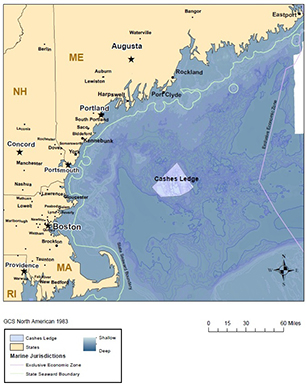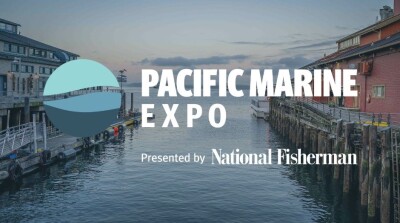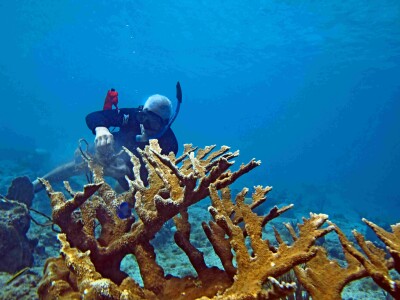Advocates for the environment are claiming the low ground as they prepare to make the case for a national monument around Cashes Ledge in the Gulf of Maine.
Map showing Cashes Ledge. Conservation Law Foundation photo.Josh Block, press secretary for New England’s Conservation Law Foundation, says such a designation would ensure that “this area remains permanently protected from harmful commercial extraction, such as oil and gas drilling, commercial fishing and other resource exploration activities.”
The truth, of course, is that where Cashes is concerned there is only one activity on Block’s mind or anyone else’s, and that is commercial fishing. The Cashes monument would encompass about 530 square miles, a mere a teacup in the Gulf of Maine, but one that generations of New England fishermen have found productive.
The fact is, exploration for oil and gas on Cashes, or for that matter, anywhere else in the Gulf of Maine, is unlikely. “There’s no resource potential,” says the federal Bureau of Ocean Energy Management.”
And Block might have pointed out that Cashes is not threatened by fishermen, given that the area has been closed to fishing, other than for lobsters, since 2002.
The move for a national monument at Cashes gives the lie, yet again, to cant about fishermen being rewarded tomorrow for their sacrifice today.
In the latter years of the 20th century, we observed a decline in New England haddock and cod. We reduced effort and haddock came back, but cod has lagged. How much of the recovery of haddock should be attributed to fishery management, and how much to environmental factors?
To that point, in the Barents Sea fished by Norway and Russia, cod and haddock have soared together in abundance, and stocks have migrated in a northerly direction. Why there and not here?
(Lest you think otherwise, there are doomsayers who decry even this, ruing the displacement of snails and sculpins and mourning a declining harp seal population. Yes indeed, seals! Tell that to the Newfoundlanders!)
Fish behavior changes, but it’s hard to predict. Permanently closing Cashes Ledge solely to protect fish habitat, which is what we’re talking about, will accomplish nothing the closure of the last 13 years hasn’t accomplished, other than it will forever and needlessly shut the door on productive grounds that for centuries sustained New Englanders and the communities from which they sailed.







